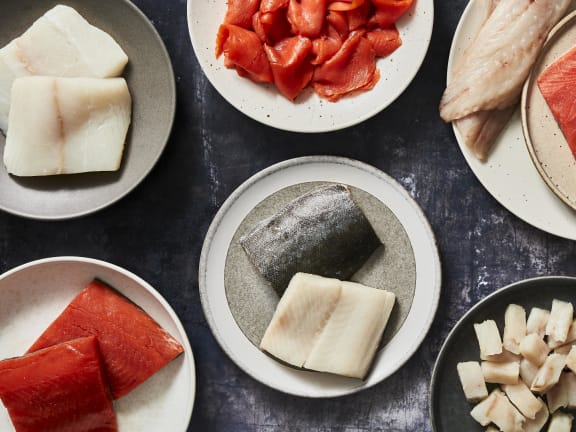Pescatarian. Vegetarian. Flexitarian. Vegan. Carnivore. Mediterranean. With many dietary options available, selecting the right one that aligns with your preferences, needs, and lifestyle can feel overwhelming. However, when considering factors such as taste, sustainability, variety, and overall health, embracing a pescatarian diet is a compelling choice. The term "pescatarian" is a combination of "pesce," which means fish in Italian, and "vegetarian."
What Is a Pescatarian Diet?
A pescatarian diet is a dietary pattern that includes seafood, along with plant-based foods (and sometimes eggs and dairy). A pescatarian is someone who follows this dietary pattern.
Pescatarians do not consume meat or poultry, but incorporate fish and shellfish into their diet. This dietary choice can be motivated by the health benefits associated with fish consumption, environmental concerns, ethical considerations, or personal preferences. Pescatarians can enjoy a diverse range of nutrients by focusing on plant-based foods and seafood while still obtaining high-quality protein and essential fatty acids from fish sources.
Potential Health Benefits of a Pescatarian Diet
Seafood can be a great source of high-quality protein and tends to be low in calories. Different types of seafood can also contain essential nutrients like omega-3 fatty acids, iodine, selenium, vitamin D, taurine, and carnitine, which all play a role in keeping your body healthy. Consuming seafood on a regular basis as part of a healthy lifestyle can help reduce your risk of chronic diseases.
We often hear about the cardiovascular benefits of consuming seafood on a regular basis. But seafood’s impact on overall metabolic and endocrine health is often overlooked. A recent review of various studies found that eating fish regularly may help maintain thyroid function, support healthy weight management, lower blood pressure as we age, improve glucose control to prevent diabetes and metabolic syndrome, and even help preserve muscle mass in older adults.
According to another study, pescatarians are less likely to be obese and generally have lower total cholesterol when compared to their omnivorous counterparts. In addition to enjoying improved overall well-being, pescatarians are projected to have the lowest healthcare costs compared to other dietary groups by the year 2050.
Is a Pescatarian Diet Good for Weight Loss?
Integrating unprocessed proteins and high-quality unsaturated fats, particularly omega-3 fatty acids from wild-caught seafood, into weight loss diets can positively affect overall well-being and help individuals achieve their weight loss goals.
Wild-caught seafood provides a sustainable source of lean protein and is rich in heart-healthy nutrients. By incorporating seafood into meal plans, individuals can enjoy flavorful and satisfying meals while working towards their weight loss objectives.
Potential Cons of a Pescatarian Diet
As a pollutant, mercury can be found in bodies of water, where it contaminates the plants, fish, shellfish, and mammals that are part of these polluted ecosystems. If you’re following a pescatarian diet, you’ll want to understand whether this contamination in the marine food web increases your exposure to mercury in ways that may be harmful to your health.
Here's the good news: most fish have very low levels of mercury, and only a few types are considered to have higher concentrations. According to the U.S. Food and Drug Administration (FDA), the mercury levels in fish are generally not a concern for most people. However, the FDA recommends that pregnant women, nursing mothers, women planning to become pregnant, and young children avoid certain types of fish — for example, swordfish, tilefish, king mackerel, marlin, and large species of tuna like ahi and big eye. Fish like wild caught salmon, pacific halibut and pacific cod are considered low in mercury.
This cautious approach helps ensure the safety and well-being of these specific groups, as they may be more susceptible to the potential risks associated with mercury consumption. So, while mercury is present in seafood at varying concentrations, it's essential to understand that most species have low levels and can still be enjoyed as part of a healthy diet.
Pescatarian vs. Mediterranean Diet: What’s the Difference?
The main difference between a pescatarian diet and the Mediterranean diet lies in including animal products other than fish and shellfish. A pescatarian diet focuses on plant-based foods but also includes seafood. It eliminates meat and poultry from the diet, making seafood the primary source of animal protein.
On the other hand, the Mediterranean diet is modeled after traditional eating patterns followed in Mediterranean countries. While Mediterranean traditions vary, the “Mediterranean diet” emphasizes plant-based foods like fruits, vegetables, whole grains, legumes, nuts, and seeds. The Mediterranean diet also includes seafood as a regular protein source. However, it goes beyond seafood and incorporates other animal products like poultry, eggs, dairy, and lean red meat in moderation.
Both diets share similarities, focusing on whole foods, plant-based ingredients, and seafood. Ultimately, the choice between the two depends on personal preferences, dietary needs, and ethical considerations.
Best Fish to Eat on a Pescatarian Diet
Each variety of seafood provides different nutrients needed to sustain overall health. Having a diverse pescatarian diet will help ensure that all nutritional needs are being met, while allowing you to explore different recipes and cooking techniques. Eating a diversity of species also helps to sustain healthy ecosystems.
Here are a few fish options to consider when eating a pescatarian diet:
-
Wild-caught sockeye salmon and coho salmon: Wild-caught salmon is known for its ability to boost a healthy immune system, thanks to its abundance of nutrients that can aid in reducing inflammation. Additionally, these nutrients can potentially promote heart health and enhance brain function. Both sockeye and coho salmon are good sources of vitamin D, a vitamin that many people lack in their diets.
-
Pacific halibut: Pacific halibut, compared to other fish species in Alaska, is a high-protein, low-fat option that can help regulate blood sugar levels and provide long-lasting satiety. Additionally, it is a good source of potassium, which can help support heart and muscle health. A 6 oz. serving provides over 100% of the daily selenium requirements, a crucial nutrient for immune system protection and thyroid function. Pacific halibut is sustainably harvested from Alaska.
-
Pacific cod: Pacific cod offers a lean source of protein that can be combined with other healthy fats in various recipes, opening up lots of delicious meal options. Pacific cod from Alaska is sustainably harvested. Atlantic cod, in contrast, is considered overfished in east coast U.S. fisheries.
-
Rockfish: Rockfish stands out as a visually appealing and firm white fish that provides the full daily requirement of selenium supporting immune, thyroid, brain, and heart health. It may have modest levels of omega-3s, but it compensates with higher levels of protein, potassium, and vitamin D.
Why Should You Make the Switch to a Pescatarian Diet?
-
Health benefits: A pescatarian diet, which includes seafood and plant-based foods, is typically rich in vitamins, minerals, and high-quality proteins, offering a well-rounded nutrient profile.
-
Sustainability: Choosing a pescatarian diet can have positive environmental implications. Depending on how it’s harvested or produced, seafood can be a more sustainable protein source compared to land-based animal products. By eliminating meat consumption and focusing on wild Alaskan seafood, you can contribute to conserving land, water resources, and wildlife.
-
Variety and culinary options: Adopting a pescatarian diet can introduce you to new flavors and culinary options. This can make your meals more exciting and enjoyable while ensuring you meet your nutritional needs.
-
Flexibility: Being a pescatarian allows for flexibility in your diet. You can still reap the health benefits of a plant-based diet while enjoying the added variety and nutritional benefits of seafood. This flexibility can make it easier to sustain your dietary choices and adapt to different situations or preferences.






